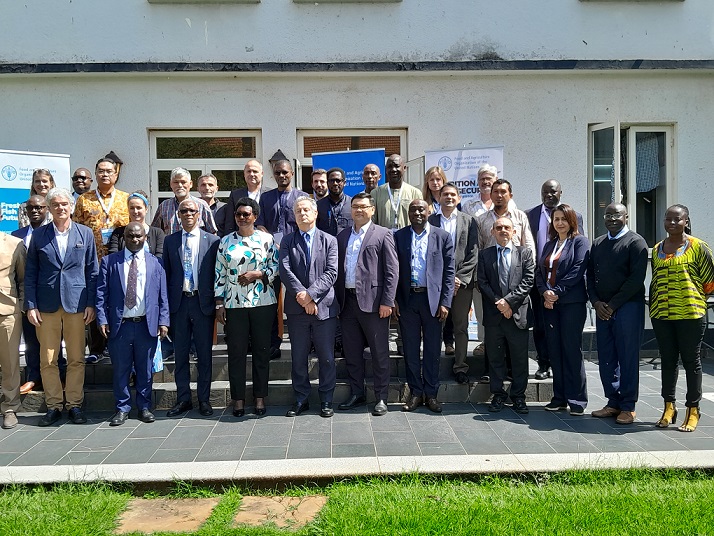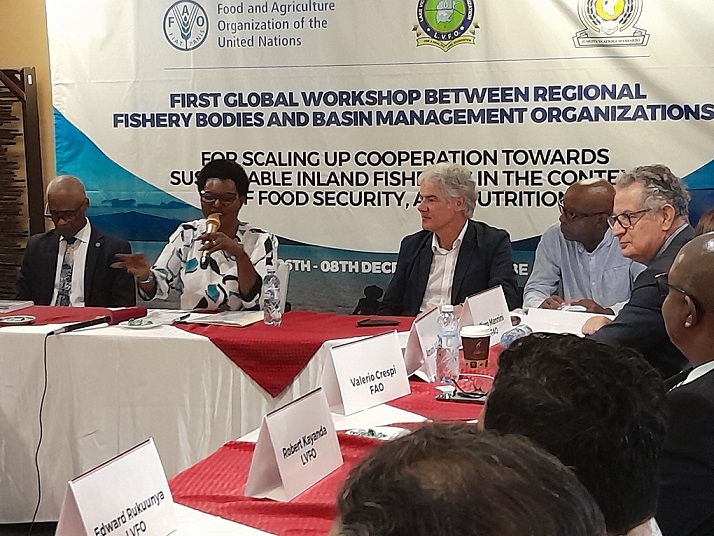
ENTEBBE – The Food and Agriculture Organization of the United Nations (FAO) has convened a global workshop to promote, discuss and establish effective regional cooperative frameworks between Regional Fisheries Bodies (RFB) and Basin Management Organizations (BMO) and to develop concerted approaches to integrate inland fisheries management into catchment area management, especially in the context of food security, nutrition and ecosystem health.
In recent years, FAO and the international community have increasingly recognized that strengthening the governance of inland fisheries is best achieved by enhancing cooperation among RFBs and BMOs, particularly those with a management mandate.
Taking place in Entebbe, Uganda, the three-day workshop is intended to conduct a stocktaking exercise to identify challenges and issues faced by RFBs globally, identify common areas of work between RFBs and BMOs which could include integrated water resources management, ecosystem, governance, and inland fisheries management aspects, develop a technical coordination framework to strengthening the collaboration between RFBs and BMOs.
Dr Antonio QUERIDO, Representative, FAO Uganda noted that inland fisheries play a critical role in human well-being and livelihoods.
According to him, annually, inland fisheries contribute to the production of 11 to 12 million tons of fish, representing 12 to 13% of the total catch from fisheries, with the majority originating from low-income countries.
“The sector provides direct employment to 41 million people, with a high participation rate of women, and supports approximately 500 million people, including those living in dependent households. Inland fisheries are a crucial source of food and nutrition, particularly protein, and generate a significant economic value of 19 billion USD through the sale of fish.”
He underscored the need for policymakers and stakeholders to prioritize the sustainable management of inland fisheries to ensure their continued contribution to human well-being and livelihoods.
Dr Antonio decried that despite their significant contribution, inland fisheries, often remain small-scale and spread out.
“Freshwater ecosystems and inland fish face substantial challenges due to environmental changes and shifts in land use such as agricultural expansion and infrastructure development. The condition of freshwater ecosystems is also significantly influenced by forest cover and forest distribution across watersheds.”
“While inland fisheries play a significant role in providing nutrition, food security, and livelihoods to many communities, they are often neglected in Integrated Water Resources Management plans. It is essential to acknowledge and integrate these fisheries into management strategies to ensure comprehensive and effective water resource management,” he noted.
FAO Uganda boss noted that freshwater ecosystems, which cover just 1% of the planet’s surface, are home to 10% of all species and they play a crucial role in providing essential services and supporting biodiversity but due to unsustainable human practices, they are facing a significant threat, which is putting their ability to provide these services and support biodiversity in jeopardy.
“This has resulted in an alarming 84% decline in freshwater biodiversity since 1970.”
He called for efforts to restore land and hydrology in watersheds to ensure the conservation of biodiversity, thriving agriculture, healthy forests, availability of wild foods, and access to dependable water resources.
Hellen Adoa – Minister of State for Fisheries said that the Government of Uganda remains committed to working with all key stakeholders nationally, regionally and internationally in promoting sustainable fisheries mechanisms through community management, enforcement and compliance approaches.

“Uganda has recently enacted a new Fisheries and Aquaculture Act, 2023 to guide the effective management and development of fisheries and aquaculture in a value chain based approach and for sustainable food security.”
She noted that aquaculture management and development is high on agenda to provide for declining lake fish resources and contribute to rebuilding of the fish stocks in the lakes and increase farmer incomes.
Minister Adoa decried “the untouchables” who have destroyed water resources for their selfish benefits.
She called upon FAO to continue fostering such collaborative arrangements that can make it easy to sustain fisheries and aquaculture initiatives worldwide while ensuring food security and nutrition but also directing some resources to the restoration of swamps.
Mr. Mugisha Shillingi Director, Directorate of Water Resources Management says that inland waters have high biodiversity value as they are home to more than 50% of all fish species.
“They support productive inland fisheries, critical for human well-being as food and livelihoods. Inland fisheries provide employment opportunities for a big percentage of our population either as fishers or in post-processing jobs.”
He said that these resources can, however, become a limiting factor for sustainable developments if not well planned and managed.
“We need to have adequate water of good quality to support the various development activities.”





